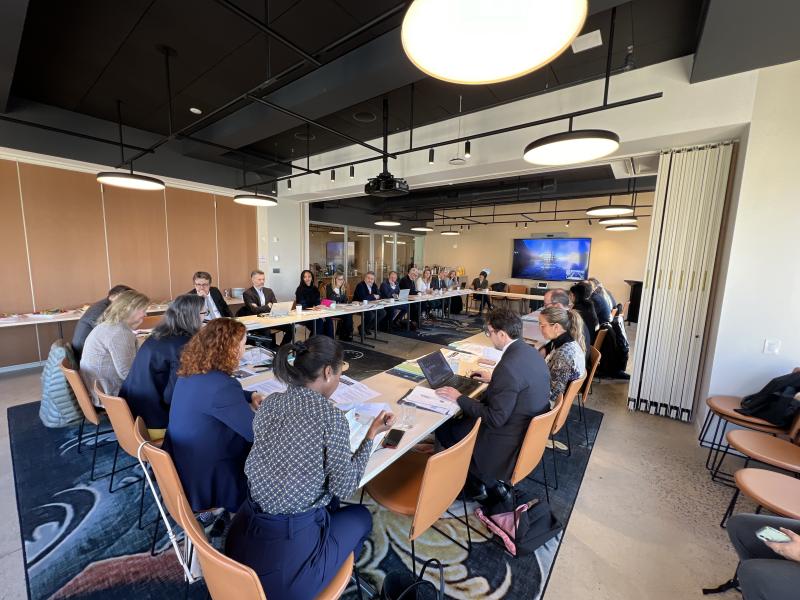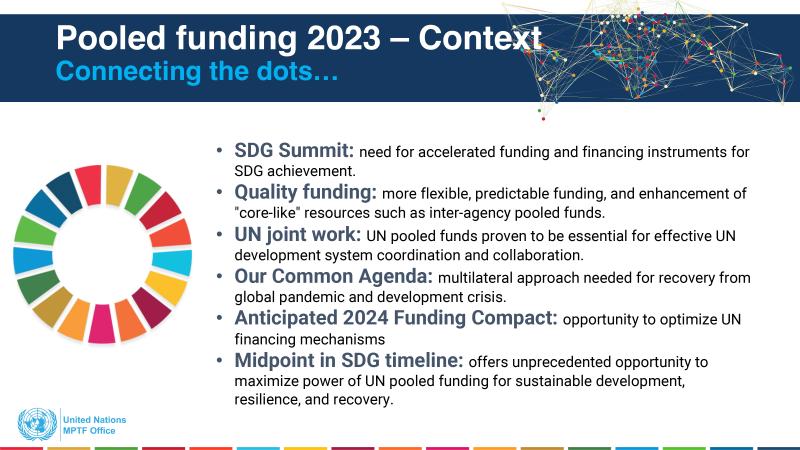

A renewed call for ambition resounded at the recent Stakeholder Forum on UN Pooled Funding, underscoring the urgent need to bolster collective financing strategies to accelerate progress toward global development, peace and climate-oriented goals.
New York, 13 December 2023. The annual Stakeholder Forum on UN Pooled Funding, organized by the UN Multi-Partner Trust Fund Office, the UN center of expertise in inter-agency pooled funding, brought together UN entities and Member States who emphasized the potential of pooled funding to streamline multi-stakeholder action, foster efficient governance, and promote collaboration, especially in complex scenarios and provided integrated solutions.
Hosted by the Mission of Norway to the UN, the Forum offered space to deepen the ongoing dialogue over strategies to tackle persistent obstacles to achieve SDGs. In essence, the participants concluded that the kind of collaboration generated around pooled funding is integral for scalable, sustainable progress on a global scale.
In this context, Oscar Fernández-Taranco, United Nations Assistant Secretary-General (ASG) for Development Coordination, painted a vivid picture. "Pooled funding is a tool that makes working in the very complex current environment possible. It eliminates competition and involves the government and UN partners in strategic discussions, refining our engagement process."
With six years left to realize the SDGs, the Forum symbolized a critical time for reflection, strategizing, and strengthening commitment to the ambitious standards set for the coming years. Participants agreed that progression hinges on robust collaboration and reduced fragmentation.
"Pooled funds, established in the early 2000s, need to evolve from time to time to make sure that core provisions are up to date with the realities that we are serving," remarked Jennifer Topping, Executive Coordinator of the UN Multi-Partner Trust Fund, highlighting the longstanding relevance of such instruments.
However, scaling up pooled funding is not without obstacles. The challenge lies in broadening the donor base and convincing stakeholders of its effectiveness and positive impact on SDG targets. Additionally, enhancing the visibility of and through pooled funds and improving the engagement of donors at the country level emerged as pivotal tasks.
Trust-building and transparency are crucial. Participants recognized the work of the UN MPTF Office, referred to as “the gold standard” on how pooled funds can be carried out transparently and efficiently. Partners also underscored the challenges of mobilizing resources with competing priorities and limited funds.
Despite challenges, the Forum was buoyed by optimism about the potential of pooled funds to make progress more efficiently and engage stakeholders from various quarters. Collaboration at the country level, fueled by country-based programmatic decisions, could pave the way for more profound results. UN Resident Coordinators from Malawi, Malaysia, Montenegro and Ukraine, showed how country pooled funds are adapting to very different contexts. Representatives from global MPTFs, such as the Peacebuilding Fund and the Systematic Observations Financing Facility shared how they are expanding partnerships and outreach with partners such as local youth and women organizations and multilateral development banks.

Participants concurred that UN inter-agency pooled funds can elevate the quality of SDG financing, including by leveraging innovative financing solutions, of which several examples were shared from funds such as the Joint SDG Fund, the Central African Forest Initiative and the Global Fund for Coral Reefs. They can bring the UN system and its diverse partners together, leading to impactful delivery on shared agendas like the SDGs, peace and transition processes, and climate finance.
Pooled funding carries immense transformative potential, explained ASG Fernandez-Taranco. He remarked, "In short, the data and evidence are clear. Pooled funding brings about the most profound changes - those of behavior. It makes a UN country act collaboratively, fostering efficient governance and steering us away from traditional earmarked funding."
In the ever-evolving landscape of funding mechanisms, renewed emphasis on pooled funding featured prominently in the Forum's call to action. With clarity about the challenges and optimism about the potential for innovative progress, stakeholders are now tasked with the pressing need to ramp up efforts to leverage the benefits of pooled funding for development and climate finance. The journey to the 2030 Sustainable Development Goals may be uphill, but accountable and innovative pooled funds can make the climb feasible.